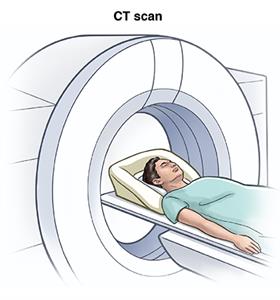Cerebral Abscess
What is a cerebral abscess?
A cerebral abscess is a pus-filled pocket of infected material in your brain. It is sometimes called a brain abscess.
An abscess can cause your brain to swell, putting harmful pressure on brain tissue. An abscess can also keep blood from flowing to parts of your brain. If you develop this problem, you will need emergency treatment.
What causes a cerebral abscess?
A cerebral abscess usually occurs when bacteria or fungi make their way into your brain, either through your bloodstream or from an infected area in your head, such as your ears or sinuses. An injury to your head or head surgery can also let in germs that can cause an abscess.
What are the risk factors for cerebral abscess?
You have a higher risk of developing this problem if you have heart defects, HIV/AIDS or other conditions that affect your immune system, or if you use medicines that inhibit your immune system. You are also at greater risk if you have had a recent injury to your head or head surgery (including dental procedures). People with a history of intravenous (IV) drug abuse are also prone to developing a brain abscess.
What are the symptoms of a cerebral abscess?
A cerebral abscess can cause many symptoms, including:
- Headaches
- Fevers and chills
- Going in and out of consciousness
- Visual disturbances
- Weakness on one side of your body
- Nausea and vomiting
- Seizures
- Changes in personality
- Confusion
- Trouble moving or speaking
- Stiffness in the neck or back
How is a cerebral abscess diagnosed?
Your healthcare provider will ask about your symptoms and may do a neurological exam to look for changes in motor and sensory function, vision, coordination and balance, mental status, and mood or behavior. They may also order a number of tests to diagnose a cerebral abscess:
- Magnetic resonance imaging (MRI) or computed tomography (CT) scan of your head
- Blood tests to look for signs of germs and other signs of infection
- Tests of a sample from the abscess to determine the cause of your infection

How is a cerebral abscess treated?
Your healthcare provider can treat cerebral abscesses with medicines, including antibiotics or drugs to fight a fungal infection. Your healthcare provider may also give you steroid drugs to lower pressure in your brain, or other drugs to reduce seizures.
You may need surgery, especially for larger abscesses. Your surgeon will go through your skull to expose your brain. He or she will drain material in the abscess and, if possible, remove it entirely. If the abscess is deep in your brain, your surgeon may need to drain it with a needle, with help from a CT or MRI scan. These help direct the needle to the right area.
What are the complications of a cerebral abscess?
Treating a cerebral abscess promptly is extremely important. Without treatment, very serious complications can set in, including death. Even with treatment, some patients might have long-term neurologic problems, such as weakness or trouble moving.
What can I do to prevent a cerebral abscess?
If you have an infection elsewhere in your body, make sure it's properly treated. This may help prevent a cerebral abscess. If your healthcare provider has suggested that you take antibiotics before certain procedures, such as dental work, be sure to follow these directions.
When should I call my healthcare provider?
Treating a cerebral abscess as soon as possible is essential. If you have neck stiffness, any type of neurological problem (including seizures, changes in consciousness, or sleepiness), or are vomiting or running a fever, along with a bad headache, call your healthcare provider and get the problem treated promptly.
If you have already been diagnosed with a cerebral abscess and are being treated, it's very important to let your healthcare provider know if any of your symptoms get worse, or if you develop any new symptoms. These could be signs that your infection is getting worse, despite treatment.
Key points about cerebral abscess
- A cerebral abscess is an infection in your brain. It is a medical emergency that requires treatment right away.
- Symptoms can include headache, fever, changes in consciousness, confusion, neck stiffness, vomiting, seizures, weakness, trouble moving, and changes in vision.
- Treatment is with strong antibiotics, sometimes along with other medicines, such as steroids, and drugs to prevent seizures. Surgery might be needed to drain the fluid from the abscess or to remove it completely.
Next steps
Tips to help you get the most from a visit to your healthcare provider:
- Know the reason for your visit and what you want to happen.
- Before your visit, write down questions you want answered.
- Bring someone with you to help you ask questions and remember what your provider tells you.
- At the visit, write down the name of a new diagnosis, and any new medicines, treatments, or tests. Also write down any new instructions your provider gives you.
- Know why a new medicine or treatment is prescribed, and how it will help you. Also know what the side effects are.
- Ask if your condition can be treated in other ways.
- Know why a test or procedure is recommended and what the results could mean.
- Know what to expect if you do not take the medicine or have the test or procedure.
- If you have a follow-up appointment, write down the date, time, and purpose for that visit.
- Know how you can contact your provider if you have questions.



